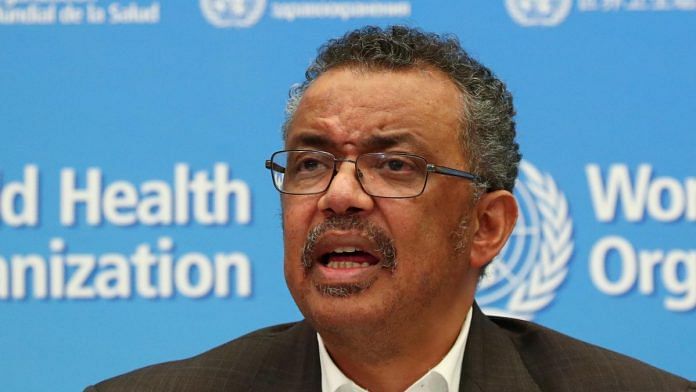Gandhinagar: World Health Organisation (WHO) Director General Tedros-Adhanom Ghebreysus Thursday said that the Gujarat Declaration — an outcome of the agency’s first-ever, traditional medicine global summit — will likely integrate the use of traditional medicines in national health systems, and help unlock their power through science.
WHO’s first-ever summit on traditional medicine was inaugurated Thursday as part of the G20 Health Ministers’ Meeting in Gandhinagar, Gujarat.
Traditional medicine systems — for example, Ayurveda, Sowa Rigpa, Unani and homeopathy — encompass a number of practices and knowledge systems that have been utilised for millennia to promote health and treat ailments. In many low- and middle-income countries, traditional medicine is the primary form of healthcare for most of the population.
The summit will see two days of detailed deliberation and knowledge-sharing on various facets of traditional medicines in the world, ranging from their need, impact, possibility of innovation, and accumulated data on their use.
At the inaugural event of the summit, Ghebreyesus acknowledged the efforts of India in enhancing universal health coverage under the umbrella scheme of Ayushman Bharat.
He also stressed on the link between traditional medicines, and the environment, saying, “Traditional medicine is as old as humanity itself. People in all nations have used traditional healing practices at some point in their lives.”
The WHO chief highlighted how the sources of many modern drugs can be traced to traditional medicines like willow bark and periwinkle which form the base for aspirin, and cancer drugs.
At the summit, Union Health Minister Mansukh Mandaviya said by embracing ancient wisdom and modern science, the world can collectively work towards achieving the health-related Sustainable Development Goals while fostering a “One Earth, One Family, One Future” ethos.
“In modern times, the demand for natural and herbal-based pharmaceuticals and cosmetics underscores the enduring significance of traditional healing practices,” he pointed out.
Established in 2022 at Jamnagar in Gujarat, the WHO Global Centre for Traditional Medicine is being developed with a strategic focus on evidence and learning, data and analytics, sustainability and equity, innovation and technology to optimise the contribution of traditional medicine to global health and sustainable development.
A document released as part of the summit said that traditional medicine-based healthcare services offer the potential to alter the economics of healthcare.
While high-capital investment in conventional medicine facilities for tertiary or quaternary care dictates the trend towards short-length of stay, albeit at a high per capita expense, lower-capital investment per bed in traditional medicine based healthcare facilities — as low as 5 to 12 per cent applicable to conventional facilities — ensures that longer lengths of stay for patients is viable, it added.
“Since typically 60 per cent or more of healthcare demand is non- tertiary/non- quaternary care in nature, the movement towards evidence-based healthcare shall ensure higher healthcare capacity building leading to a healthcare system that is affordable, accessible, acceptable to all,” the statement read.
The reporter is part of a media delegation attending the G20 Health Ministers’ meeting in Gandhinagar on the invitation of the Union health ministry.
Also read: In I-Day speech, PM Modi promises to double ‘Jan Aushadhi Kendras’ from 10,000 to 25,000



